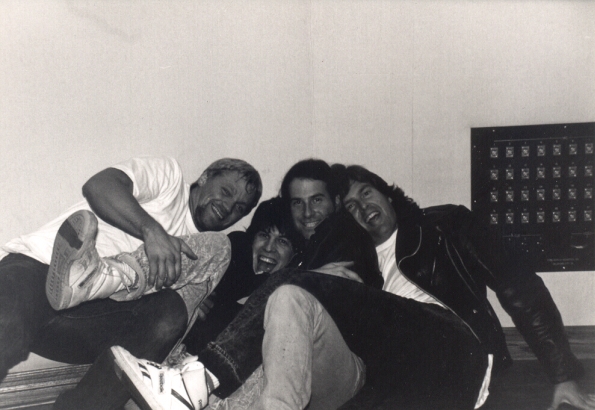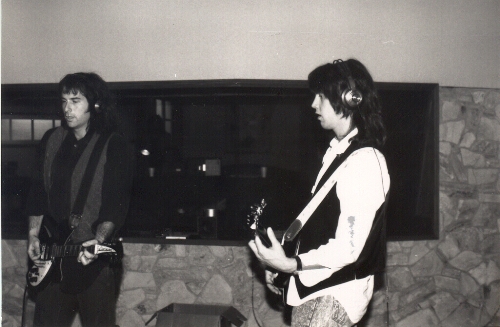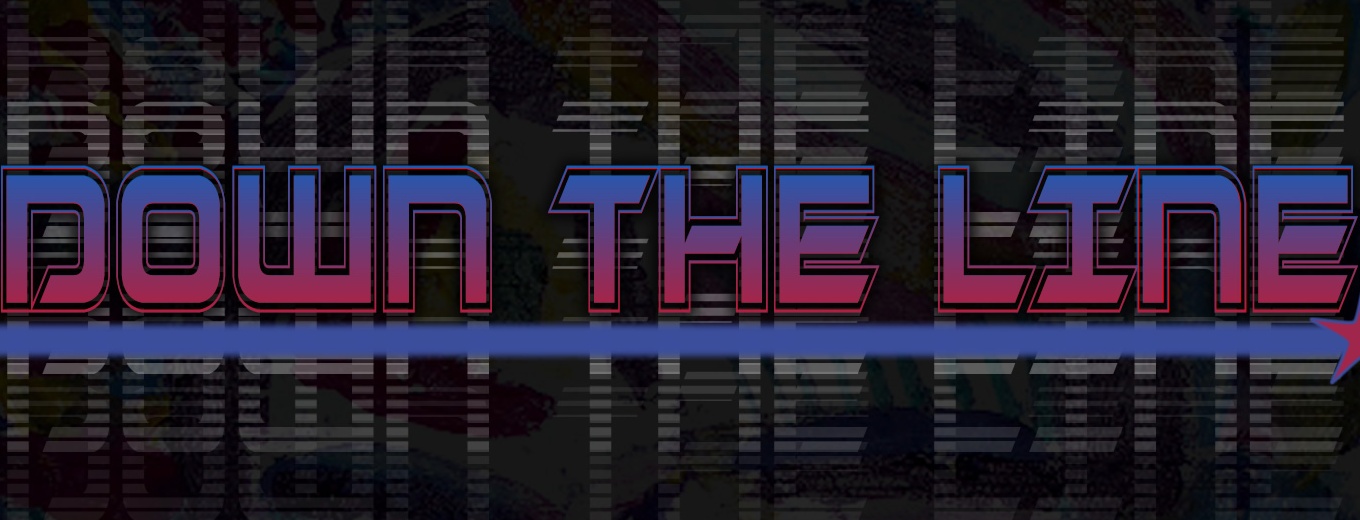
Tony, Rick, Doug, and Dave at Weddington 1989There’s nothing cooler than liking a band and finding out years later that there has been a release they put out that you knew nothing about. Such was the case for me with power-pop rockers The Stand. Fronted by Tony Valenziano (and putting out a mere three albums), The Stand was a one of a kind act back in the 80’s when most people were still listening to mainstream acts. Their first release was Heartbreak Town – a fun, straight up rock record that echoed back to an indie pop sound, but broke new ground when compared with what was in the market at the time. Heartbreak Town was a tremendous album – one of those albums that you just never forget. One that has stayed with me ever since the first listen. Plus, they do a great version of “Amazing Grace,” which is my favorite song of all time. You just can’t go wrong.
After Heartbreak Town and a lineup change The Stand released In Three Days. Musically it was very similar to the first release, but it also had a bit of a crunchier sound as well as the best version of “(What’s So Funny About) Peace, Love and Understanding.” Valenziano’s voice is so crisp that he can bridge the gap vocally between the poppier tunes and the more powerful and driving songs. Their last record (Replay) was released almost a decade ago in 2002. This one could be the genre standard for a power pop release: it is loud, fast, well produced and a lot of fun to listen to. You can still find Replay on amazon.com, but if you can find the other two releases snatch them up when you get a chance!
Can you tell me who the original players in The Stand were back around the Heartbreak Town era?
The original players on that record were me, Rick Steadman on guitar, the drummer was a guy named Dave Fish and we had a few bass players one of which was a guy I went to college with Doug Knectal. Around the start of Heartbreak Town we played a gig and a couple of guys at the show came to us and said they really liked the show, it was great and they wanted to do a production deal. So we kind of got the run of the studio, or I did, and I even ended up working there to make sure that we would always have studio time. In those days the cost of tape was large, and you always had to pay an engineer and stuff, but I was there and I was learning how to run boards, how to hear things, produce stuff and engineer stuff. So I ended up doing all those things and all the songs that ended up on Heartbreak Town I had actually done as demos. Once we got signed we went back to fine tune everything and the guys from Wonderland said they just wanted to remix, they loved what we already had and wanted to go with it. So really what you hear on that first record is us just playing and doing it, there were no click tracks, the drummer just kept tempo and went with it. The lead vocals were kept because that’s just how we sounded when you caught the band live, minus a few overdubs on some of the more acoustic songs that was us just hitting town and playing.
Those guys were fun to play with, we had been together at that point for a couple of years and we just had a good time. We probably hid in a garage for about a year (laughter) until we got it together, but what you hear on Heartbreak Town is what we sounded like after a good two years of playing together.

According to what I’ve pulled online, Heartbreak Town came out in 1990?
Yeah, I think we recorded it in ’88 or ’89 but it came out in 1990.
Did you guys record or release anything prior to Heartbreak Town?
Heartbreak Town was the first real release we did, we had done some compilations and we had done our own little EP type of thing. The guys at A&M, once they found out there were Christians in the band, they wanted us to check out Word Records, and they thought Word should distribute us, but we actually signed to What? Records…
Yeah, Tonio K. was on What? I believe…
Yeah, I knew Tonio K. from when my father was running Arista Records, and I was working in the mailroom at the time back in the late 70’s or mid ‘80’s. I remember our bass player was the original guitar player in The Choir. Gary jumped that band and came to The Stand and I remember he kept swiping Tim Chandler’s gear because he needed bass gear. So we were trading out with them because Gary needed gear and The Choir needed a place to rehearse, and they ended up getting signed to What? as well. Tonio K. was there, ideola (Mark Heard), Dave Perkins also… but the label ended up going under and disbanding.
The guys at A&M had already heard us. So originally A&M heard us, Wonderland came secondary… A&M wanted Word to take a look at us, but back then Word wasn’t signing any alternative acts or anything that wasn’t a church oriented band. It was really a new frontier for us, we weren’t a church band, and we had played maybe 10 churches in total at the time. We did play Creation Fest, maybe also Atlanta Fest, but we were in a different territory for a band like us at that time. So, we signed to What? originally but then ended up on Wonderland.
Yeah, it seems everything was so connected back then, all the bands knew each other and worked/played with each other…
Yeah, it was just the place for that. I was playing in another band called The Ricky’s, we were pretty popular on the LA club circuit, and I was finding that there were a whole lot more Christian guys that were playing in bands and not just playing Christian gigs. A lot of those guys were of that mindset, as a matter of fact Steve Hindalong played in one of my favorite bands of all time called The Lucky Stiffs. I knew they were Christian’s but they were just great musicians in it for playing the music… a great power trio.
It was that time where a lot of guys who lived here then would come out… Phil Keaggy would come out, Lynn Nichols would come out and everyone would come out not so much to support the bands, but to see what everyone was doing at the time. I guess this was around that same time that Phil Keaggy’s Sundays Child album came out. I was playing Rick’s and VOX’s, as most of us were, or Marshall’s and Gretsch’s and all that kind of stuff. Rick Elias was working with all that stuff too and then one night some of the guys from Costa Mesa were working, Tim Chandler called and asked to use some of my guitars and amps and stuff. I didn’t really know what it was for at the time but found out later that was when Lynn was working on the Sunday’s Child record and he was all about using that type stuff.
On that Chagall Guevara record that’s all Nichol’s and Perkins were playing, just Rickenbacker’s, Gretsch’s, old weird Gibson’s… just all that really fun stuff. So it was really kind of a cool scene, everyone was just into the music and it wasn’t a scene where you just had to be overwhelmed with the “Godly” aspects of it. That was how we talked to people and everything was under toned with that, and people would come up to us and ask about something they heard us singing about on stage. It was an interesting time and it had a really cool underground vibe to it.
What happened next for you guys after Heartbreak Town?
Well it was kind of a weird time for us because everyone who worked on our stuff had jumped to Epic Records. We kind of got lost in the shuffle and things had also been building up internally with guys in the band getting married, not wanting to go on the road or wanting to get a “real job.” We were all also around 25, 26 or 27 years old too, and while that is still young, back then that was starting to get old. It wasn’t like it is today where a 50 year old guy can play and release his music, do a great job, the kids will like it and be happy with it and they don’t care about his age, they like what they like. Back in ’82 or ’83 it was different; it was all about being young and being in a cool band.
Anyway, I got another bass player again, Mark Robertson who had been in Brighton. He and I had been friends prior; as a matter of fact we are still really close friends. So, Dave and Rick had just gotten “real” jobs, I wanted to move back to Chicago to be centrally located so we could tour. So we did the record In Three Days with a new lineup, Mark played the bass on that and we toured behind that album. Then I started going through some things, ended up going through a divorce, moving back to LA to try and salvage that which didn’t work, so that put an end to things for a good while.
Then in 2002 the original guys got back together again, originally I thought we were just going to do some demos, but it really started turning into something. I had started a label at that point named Smile Records, and with the distributor I basically said, “here’s a bunch of product, we’ll do 12 or 13 of these tell me what you like.” So everyone had their pick and when they finished picking what they liked, everyone had one record as the common denominator, and that happened to be ours. I didn’t tell them that up front but after they picked I told them that record they all liked happened to be my band, they all thought it was cool that I was out there in the trenches but also pulling for everyone else and so we decided to do that record which came out in 2002 and was called Replay. The funny this is many of those songs from Replay were demos and tracks that we had done before Heartbreak Town, we just hadn’t finished them up or completely polished them from where we started. We had a good time with that record, but it was the last time that we recorded as The Stand. It was fun though; we went out and toured the Midwest again behind that album.
Is Smile Records still what you are doing right now?
Smile Records started in 1995 and ran through 2005. Within the last two years I have started my own label again, Model Music Group, and I’m with Universal Music. My first artist is John Waite and his release came out just a few weeks ago. We are what most people would call “heritage” music; John was lead singer of The Baby’s and Bad English. We look at bands like The Outfield, The Bangles, Julian Lennon, Ambrosia and bands of that day that are still relevant and making music. In between I have still been producing as well, if you want to produce in this town you have to have your own label.

Do you miss playing?
Yeah I do. I miss playing my stuff, I really do. It’s kind of like when I throw a birthday party or a New Year’s party, usually the house band is like Clem Burke from Blondie on drums, Prescott Niles from The Knack on bass, Coz Canler from The Romantics on guitar, Nick Heyward singing and then me playing with those guys thinking, “How did I get here.” We would play covers of bands and that kind of led to a joke about me being the “jukebox boy,” because any song that someone would suggest I would know how to play. So, I still get to play but I miss playing my stuff.
Is there anywhere to purchase any of the acts that were on Smile Records?
Yeah, the Replay album is still out there, you can find that on Amazon.com. I did a couple of bands afterwards; one of those was called Smash. Lynn Nichols produced Smash, and they were an off shoot of The Stand. We had done some songs as The Stand that Epic Records had, but we had a no competition clause so I couldn’t use the name and I couldn’t use those tracks that we had recorded. What I did was go back and re-record those tracks with Lynn and my buddy Paul (from One Bad Pig); Dave Perkins was also on it. It was kind of like The Partridge Family meets The Raspberries at a Turtles concert, that style of pop. That developed into a band called The Ultra Suede. The Ultra Suede was a really fun thing for me.
The Ultra Suede was a pleasure; I mean we would have three lead singers on a song. It was great man; I mean it was just interesting and fun. There wasn’t any pressure on one guy; it was really a band where everyone contributed. I did come up with all the songs, but then all of us sat down and wrote the lyrics and if there was changing anything we all pitched in. I didn’t want to go back to something like The Stand where I had to write, control, book, play, record and engineer, I didn’t want to be that guy anymore. I wanted it to have more input, and in that regard is why that was my favorite band.
Is there anything else that you want to get in and let people know?
Well, when you’re in a band you really do get off on watching people get off on what you’re doing. So when I was up there playing and doing my stuff, I got really excited about watching people get into what I was saying and who I was being. That was fun. When that kind of goes away and fades there has to be some other kind of stuff. Where I was always most involved and felt my creativity was happening was behind the console, making records, making music and creating there. That is it, that’s it for me. I know this business, I know my place in this business, I am who I am and I’ve done what I’ve done. Put that all together and that has led me to here to where I’m running a pretty decent thing again. I absolutely love running a label. I’ve been fortunate to be able to decide which route to take.





Leave a Reply